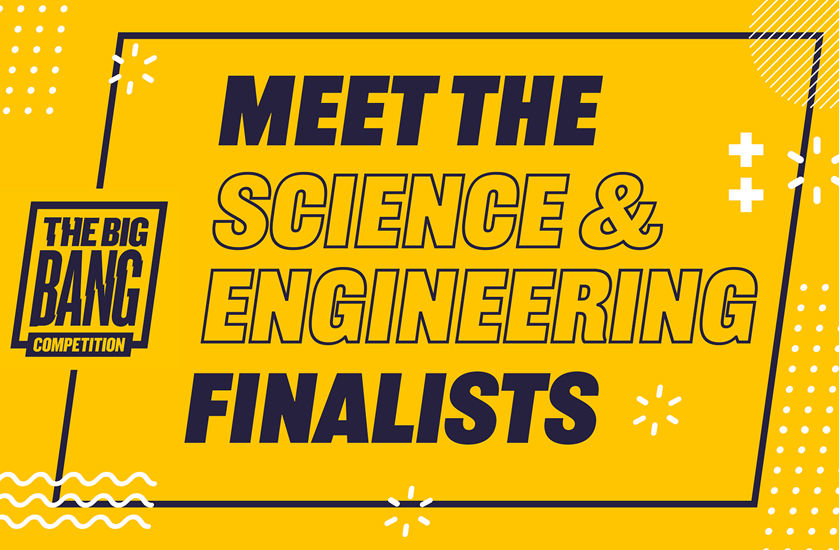Jun 17, 2021

From designing cheap inserts to improve the function of face masks to writing algorithms to compare package holidays, 10 remarkable projects from young people aged 13 to 18 have been shortlisted to compete for a major national title as part of this year’s finals of The Big Bang UK Young Scientists & Engineers Competition.
The shortlists
The incredible young people vying for a cash prize of £2,000 and the prestigious title of GSK UK Young Engineer of the Year are:
- Bhuvan Belur, from London, who created a sensory device for people who have balance issues, such as vertigo or Parkinson’s, that they can wear around their body and prevent them from falling
- Benjamin Herbert-Owen, from Essex, who developed a prototype of a fridge that was a bike accessory to keep cold refreshments cool on long journeys
- Serena Jacob, from Bedford, who created an app that will help people recognise their risk for developing Type 2 diabetes
- Ludovica Knight, from Eastbourne, who created a model wind turbine that collects and stores energy with an aim of helping villagers in Chad, Africa draw water from a well
- Kaede Sugano, from Rugby, who created her own algorithm to compare different package holidays for a new website
The shortlist for the GSK UK Young Scientist of the Year is:
- James Barber, from Cambridge, conducted an experiment to see which one of his family’s mouthwashes was the best at killing microbes
- Saashi Ghaie, from Coleraine, Northern Ireland, designed a face mask insert that is inexpensive to produce, more comfortable to wear for long periods and just as effective as a surgical mask
- Kell Johnston, from Hexham in Northumberland, investigated whether water from willow trees could be used to help grow plants and be an environmentally friendly alternative to synthetic products
- Jess Kerbiriou, a home-school student from Hackney in London, investigated the effects of a high-protein diet on her father’s diabetes
- Alex Lockyer, from Essex, created a brain training computer software programme to manage the symptoms of OCD (Obsessive Compulsive Disorder)
Over 200 projects submitted to The Competition
Dr Hilary Leevers, Chief Executive, EngineeringUK said, “With this year’s Big Bang Competition running a little differently to normal due to the Covid-19 pandemic, we’re incredibly impressed that we’ve received over 200 projects. Throughout the past 16 months young people have shown great resilience and determination – they have had to manage multiple lockdowns, periods of remote learning and restricted access to equipment.
“It is a huge achievement to progress to this stage of The Competition and all the finalists should be incredibly proud to take up their place.
“I’m particularly struck not just by the ingenuity of each of these young people but their desire to help others or improve society and apply their science and engineering skills to real-world problems. To see their ambition, passion and enthusiasm for STEM at such a difficult time is truly inspiring. We can’t wait to hear who’s won at the Big Bang Digital online event on 23 June.”
Find out the winners at Big Bang Digital
The 3-day event, Big Bang Digital: Redefine the future is taking place from Wednesday 23 June to Friday 25 June and is aimed at 11 to 14 year olds. It will be packed full of inspiring and interactive sessions, opening young people's eyes to future developments they could be part of. The finalists will find out if they have won the top prizes, including the coveted title of GSK UK Young Engineer and GSK UK Young Scientist of the Year on Wednesday 23 June. Other prizes include 7 Special Prizes sponsored by The Energy Institute, Network Rail, Royal Air Force, Stantec and Just Eat, among others.
Registration for Big Bang Digital is via schools.
For more information about The Big Bang Competition and Big Bang Digital visit: www.thebigbang.org.uk
< Back to News & Views